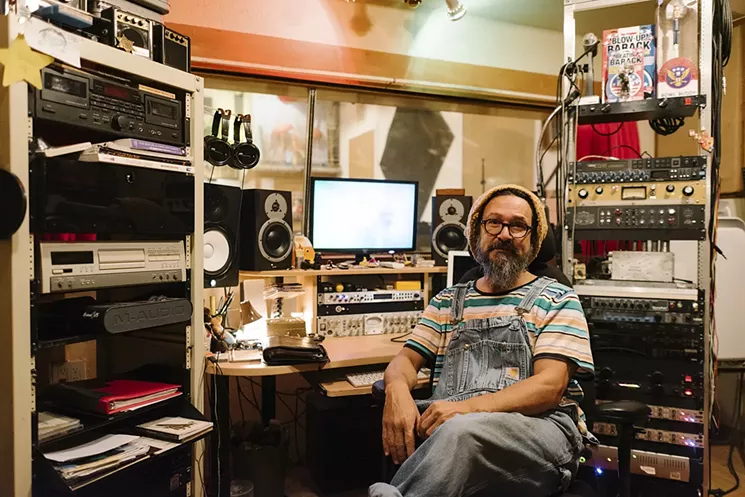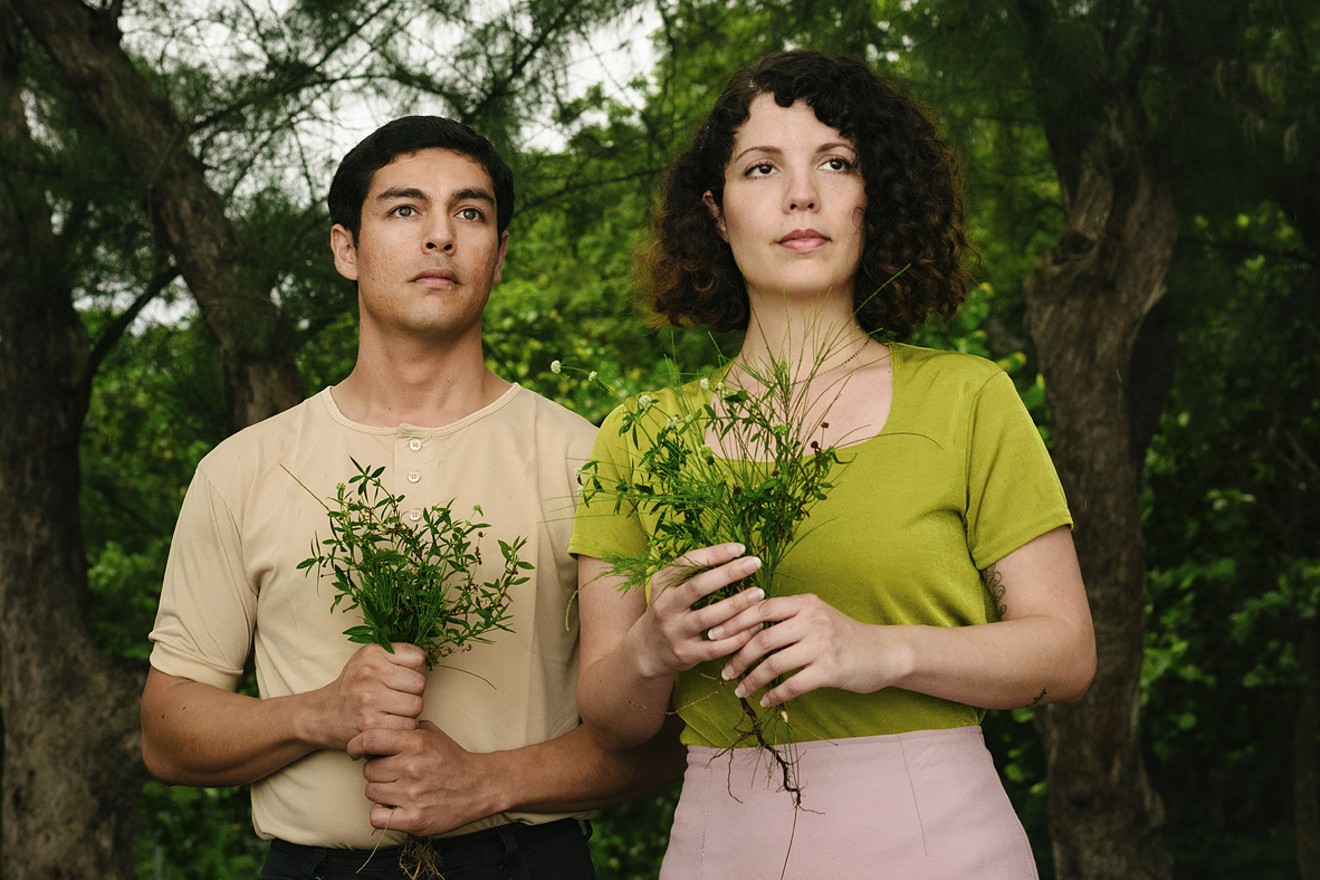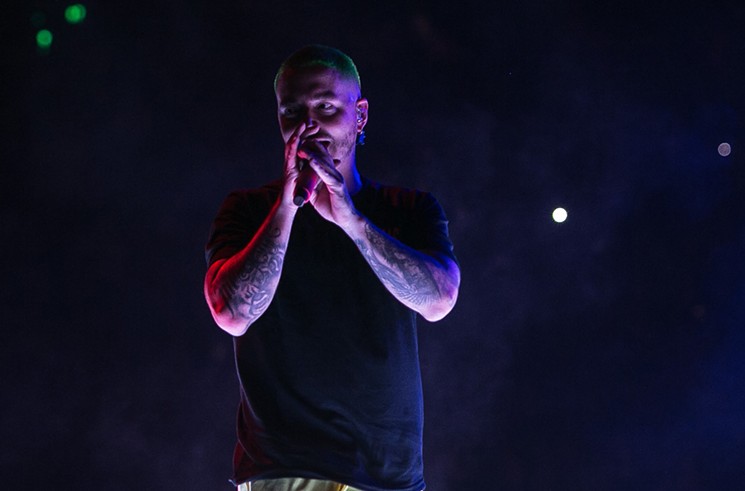Dorys Bello and Eli Oviedo of the Miami band Dracula grew up singing in Spanish before they could speak English. Bello's parents are Cuban immigrants, and Oviedo is from Honduras. Onstage, the two 34-year-olds harmonize side-by-side while Oviedo strums the guitar. His light eyes glimmer as he sings like a Gabriel García Márquez character might, in a voice filled with specters of his homeland. With her soft brown waves and sad eyes, Bello looks like a Cuban Madonna holding a mike instead of a baby Jesus. The sound of their haunting interpretations of recognizable tunes such as Selena's "Como la Flor" and the Mexican folk song "La Llorona" envelop audiences like the warm, crusty cape of that ancient vampire.
Older crowd members mouth the lyrics. After the show, some fans tell the duo that they used to dance to these songs as kids. Others say they didn't understand any of the words but thought the music was beautiful. When the pair played a noise festival in North Carolina, a Chilean woman in the audience told them: "You made me feel at home."
Earlier this year, the band's debut LP, Dorys & Eli, garnered a positive reception. The album, released on the local label Sweat Records Records, includes six songs in Spanish. When the two shy, thoughtful, and sometimes playful artists met at the age of 19, Oviedo introduced Bello to music he enjoyed en español. "So, naturally, when we started singing the songs we loved, we included Spanish songs," Bello says. "Our parents love it and get to sing along."
There's power in their delivery. Singing in Spanish helps to create an instant emotional, cultural, and possibly political connection between these artists and their listeners.
Miami-Dade County's population is nearly 69 percent Hispanic, but its music is largely written in English. The Magic City has always offered venues for fans of Latin styles, but homegrown musicians interested in catering to a national market have long considered singing in Spanish to be a dead end.
"If you are white and affluent, speaking Spanish is positive and productive, but if you are brown and poor, it's cultural baggage."
tweet this
Some local acts have found broader popularity singing in Spanish or Spanglish. In 1980, Miami Sound Machine, led vocally by Gloria Estefan, released a Spanish-language album, Otra Vez, but the group hit it big five years later with "Conga" — an English-language song about a Latin dance. Estefan released her first Spanish-language solo album, Mi Tierra, in 1993. Though she was an established American recording artist, the industry pigeonholed Mi Tierra; she received a Grammy for Best Tropical Latin Album and was named Best Female Artist of the Year at the Billboard Latin Music Awards.
Cuban-born singer-songwriter Nil Lara garnered a national audience in 1996 with "Amor en Ti." Lead singer of the Grammy-winning country act the Mavericks, Raul Malo, also penned songs in Spanish, such as 1998's "La Mucara." Into the 2000s, IDM beatmaker Otto Von Schirach and Afro-Cuban act the Spam Allstars also drew an international following for their songs with Spanish lyrics.
Those have been the exception until recently.
As the Trump administration has cracked down on immigrants and as xenophobia has become rampant, many musicians have felt empowered to express their Latinx identity through song. And now that international music has become more available online, it seems Spanish songs have legs, and the artists know how to use them.
"It's time we stand up to and raise awareness about language ideology," says Melissa Baralt, an associate professor of applied linguistics at Florida International University, "and singing in Spanish is one way to do so."
Baralt also notes complex issues around race and language in America. "If you are white and affluent, speaking Spanish is positive and productive," she says, "but if you are brown and poor, it's cultural baggage."
This harmful language ideology, she says, can affect people's success in life. In her research, she has found that immigrant parents "are abandoning their heritage... and speaking nonnative English only with their children, which affects their children's language development and pre-literacy skills later on." These issues might be mitigated if Spanish were more culturally acceptable to speak and sing.
Assimilation and Shame
Mario Giancarlo Garibaldi was born and raised in Lima, Peru. He has long been a staple of Miami's music scene, where he launched his indie-rock outfit Modernage in 2003 and dance project Hunters of the Alps in 2011. His uncle is '60s Peruvian folk musician José Escajadillo Farro. Garibaldi, with his black hair, high forehead, scruff, and thick-rimmed glasses, looks the part of an accomplished and understated indie rock star. Now 41 years old, he's senior manager of music development and live events at Univision.
But writing songs in Spanish didn't come naturally.
Garibaldi's family immigrated to Hialeah when he was 12. He felt pressure to assimilate and learned English fluently in one year. "When you're a kid surrounded by kids who mostly speak English, you want to be like them," he says. So, when he began writing songs, he says, "I didn't even think twice. I started making music naturally in English. It's the language in which I think and speak."
"I had all of these incredible ideas that just don't translate well in English."
tweet this
With Modernage in the early-2000s, "it never dawned upon me that I could do anything in Spanish, because most of what we liked was in English," he says. "I wasn't always sure... there was even an audience for that."
He feared seeming out of touch or irrelevant. "The cats doing stuff in Spanish back then were very bluntly doing things with Caribbean roots and reggae roots, mostly in the dancehall or fusion of Latin salsa," he says. "There was this perception at the time, especially in the early 2000s, that if you did anything in Spanish, it wouldn't be cool. To some degree, I am a little ashamed and embarrassed that I kind of was agreeing with that at that point in time. I was young and got caught up in that scene."
Six years ago, he began writing in Spanish and liked it. In 2017, he launched Private School, a Spanish-language prog-rock endeavor, with fellow musician Alvaro Jeanneau. Though for years Garibaldi had unsuccessfully tried to break into South by Southwest, last year Private School landed two showcases at Austin's mega-music festival.
"I had all of these incredible ideas that just don't translate well in English," he recalls. "This was the time. It just felt right. I wish I would have done it sooner."
World Wide Web en Español
YouTube and other streaming platforms have shifted the way people listen to music, including the Latin variety. In the '90s, Latin music on the radio was "Macarena," "Livin la Vida Loca," and the insidious earworm "Smooth." But lately, listeners have been able to explore and access more genres, which has given rise to nontraditional sounds. Reggaeton artists such as Bad Bunny and J Balvin tour and chart internationally. "I think that has, to some degree, trickled down to where the alternative scene is benefiting from it," Garibaldi says. "Now kids can like trap as much as they like shoegaze. It's perfectly fine to like a big reggaeton artist and to like an obscure artist who wins a Latin Grammy."
"The Spanish... in mainstream pop has been stereotypical, using words like loca, fiesta, and siesta."
tweet this
Stefanie Fernández, a producer for The Atlantic, music journalist, and former New Times contributor, says, "Streaming has made it so that mainstream pop is tapping into this Latin explosion really heavily." Pop musicians are aggressively pairing up with Spanish-language artists to maximize profit and exposure. Examples include the Jonas Brothers singing in Spanish on Colombian vocalist Sebastián Yatra's track "Runaway," which also features reggaeton king Daddy Yankee and Dominican singer Natti Natasha. There's also the unfortunately titled "South of the Border," an Ed Sheeran song that includes Dominican-American rapper Cardi B and Cuban-American singer Camila Cabello.
"The Spanish we've heard in previous decades in mainstream pop has been stereotypical," Fernández observes, "using words like loca, fiesta, and siesta that don't feel authentic... It ranges from harmless to songs like 'South of the Border,' which rely on dangerous stereotypes."
The internet has altered artists' approaches to Latin genres. "I think there's always been pressure if you're a Latin musician to do the Latin thing," she says, "but I think there's more freedom now to... just do your own thing."

P'alante
Ferny Coipel is the dread-headed, bespectacled Hialeah native and frontman of the Miami pop-rock group Humbert. He liberally sprinkles his English sentences with Spanish words for emphasis. Fluent in both languages, the 50-year-old son of Cuban immigrants has been making music in Miami since he was 14 years old. He started out with the band Airborne, whose name he describes as "like a disease."
Coipel recently recorded a Mexican ranchera in Spanish, "Señor," which he wrote for his father. The title, he notes, can mean "God" or "mister." "In English, there's no lyric or way of approaching it that has the same gravitas," he says. Even so, throughout his long career in music, Coipel has released only four songs in Spanish, and all for his previous band, I Don't Know. "Personally, I don't think Spanish is a good language to sing rock," he explains. "It sounds cheesy."
Coipel also owns the Hialeah recording studio and rehearsal space the Shack North, where generations of musicians in Miami have honed their skills. Among them are Electric Piquete, Dama Vicke, Fernando Perdomo, Rick Moon, and Lori Garrote. "At our studio, in 33 years, I haven't seen a giant switch-over from English to Spanish," he says. But he's heard more artists use Spanish words, phrases, and back-up vocals.
Though Coipel isn't about to launch a Spanish project, he notes the language works well in protest songs. Anti-communist Cuban singer Gorki Águila rehearses at the Shack. "If he's singing about how he loves this chick in Spanish, it's cheesy," Coipel says, "but if he's singing about porque la policía, it doesn't sound as forced. It has a ring to it."
"This is us and we're proud of ourselves, and you can't make us leave."
tweet this
Many believe singing in Spanish is itself a form of protest. Not until recently did 28-year-old Ale Campos of the alt-punk outfit Las Nubes fully understand the power of cantando en español. Growing up, Campos associated the Spanish language with her Argentine and Cuban immigrant parents, "and everything they did was lame," she laughs. Still, her newest endeavor includes songs in Spanish. Iggy Pop recently played one of Las Nubes' tunes on his BBC Radio 6 show, Iggy Confidential. He even pronounced the group's name, which means "the clouds," correctly on-air.
Once Campos began dating Gabriel Duque of Zeta, a Venezuelan punk-hardcore band now based in Miami, she was inspired to "not be so self-conscious" about her Spanish, which she had always considered not fluent. She realized what it means to be Hispanic in America. "I never really thought about it until this new administration came into office, how incredibly racist some people in this country are — and that in and of itself is un-American," she says. "I want to embrace my culture and be proud of my culture."
The lyrics to Las Nubes' songs in Spanish don't use the rhyming tropes of fiesta and siesta; instead, they are powerful, personal, and properly poetic. In "QSW," Campos sings, "Nunca caimos en patrones/Nunca tuvimos esa oportunidad/Sin entender el sistema/Sin complacer las demandas." ("We never fell into patterns/We never had the opportunity/Without understanding the system/Without satisfying demands.")
Recently, she's seen more bands in Miami singing in Spanish. Among them are the punk-rock group Antifaces and acts from Latin America such as Zeta. "It's a giant fuck-you," she says. "This is us and we're proud of ourselves, and you can't make us leave."
This freedom is incomplete, though. As an American citizen, she's well aware of her protected position and thus has the option to speak out.
Dracula's Oviedo holds a similar perspective on the increasing frequency of Spanish lyrics in Miami music. "It's possible it might be happening because of a renewed sense of solidarity amongst the Spanish-speaking community," he says. "I feel like it makes sense that this resolve... would crystallize... through Spanish lyrics."
El Futuro
Miami-born children's musician Alina Hevia, AKA Alina Celeste, has 83,000 YouTube subscribers. A couple of months ago, the 40-year-old released a bilingual album with six songs in Spanish, Love Is Te Quiero, which translates to "Love Is I Love You." In some of the songs, she explores her feelings about growing up as the child of a Cuban immigrant father. Though she isn't a native speaker, she first wrote a lullaby in Spanish ten years ago for a pregnant Nicaraguan friend.
Hevia built a career as a children's singer in Los Angeles. When she moved back to Miami in 2014, she found almost no musicians employing Spanish in their music. "I think it's partly because in the Latin community, singing songs for kids is not seen as a formal career," she says. "I feel like third- and fourth-generation Latin kids are going to take riskier moves than first- or second-generation." She knows of several other musicians in the national children's music scene who are beginning to release albums in their native languages. "I think we're all feeling that we need to assert our identity as bilingual Americans."
"Children who speak multiple languages shouldn't be ashamed of it; they should be proud of it."
tweet this
Hevia believes the bilingual community where she was raised is being threatened by anti-immigrant activity. "In the past five years, there's been this 'go back to your country' attitude," she says. "One of my main goals is to normalize multiple languages, to celebrate and encourage it. [In America], we're supposed to be welcoming of immigrants. I think children who speak multiple languages shouldn't be ashamed of it; they should be proud of it."
At her shows, she asks the young crowds: "Is there anyone here who speaks Spanish?" In Orlando recently, a girl squealed, "I do, and my mommy does." Children are excited at the rare opportunity to hear kids' songs in Spanish and express their identities. That excitement, Hevia notes, wanes. "At some point, people get embarrassed, not when they're 5, but when they're 12."
That feeling of pride and excitement could remain strong if more musicians raised their artistic voices in their ancestors' language. Finding strength in numbers and on the internet, artists such as Hevia can empower and inspire immigrant children and future generations to proudly stick it to bigots and make it big by singing their stories in Spanish.















